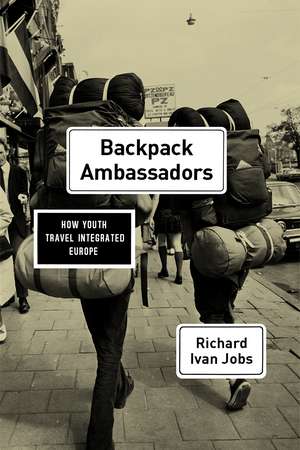Backpack Ambassadors – How Youth Travel Integrated Europe: Emersion: Emergent Village resources for communities of faith
Autor Richard Ivan Jobsen Limba Engleză Paperback – 12 iun 2017
Even today, in an era of cheap travel and constant connection, the image of young people backpacking across Europe remains seductively romantic. In Backpack Ambassadors, Richard Ivan Jobs tells the story of backpacking in Europe in its heyday, the decades after World War II, revealing that these footloose young people were doing more than just exploring for themselves. Rather, with each step, each border crossing, each friendship, they were quietly helping knit the continent together.
From the Berlin Wall to the beaches of Spain, the Spanish Steps in Rome to the Pudding Shop in Istanbul, Jobs tells the stories of backpackers whose personal desire for freedom of movement brought the people and places of Europe into ever-closer contact. As greater and greater numbers of young people trekked around the continent, and a truly international youth culture began to emerge, the result was a Europe that, even in the midst of Cold War tensions, found its people more and more connected, their lives more and more integrated. Drawing on archival work in eight countries and five languages, and featuring trenchant commentary on the relevance of this period for contemporary concerns about borders and migration, Backpack Ambassadors brilliantly recreates a movement that was far more influential and important than its footsore travelers could ever have realized.
From the Berlin Wall to the beaches of Spain, the Spanish Steps in Rome to the Pudding Shop in Istanbul, Jobs tells the stories of backpackers whose personal desire for freedom of movement brought the people and places of Europe into ever-closer contact. As greater and greater numbers of young people trekked around the continent, and a truly international youth culture began to emerge, the result was a Europe that, even in the midst of Cold War tensions, found its people more and more connected, their lives more and more integrated. Drawing on archival work in eight countries and five languages, and featuring trenchant commentary on the relevance of this period for contemporary concerns about borders and migration, Backpack Ambassadors brilliantly recreates a movement that was far more influential and important than its footsore travelers could ever have realized.
Din seria Emersion: Emergent Village resources for communities of faith
-
 Preț: 176.91 lei
Preț: 176.91 lei - 9%
 Preț: 351.24 lei
Preț: 351.24 lei -
 Preț: 148.18 lei
Preț: 148.18 lei - 16%
 Preț: 136.91 lei
Preț: 136.91 lei -
 Preț: 216.80 lei
Preț: 216.80 lei -
 Preț: 183.74 lei
Preț: 183.74 lei -
 Preț: 139.64 lei
Preț: 139.64 lei - 9%
 Preț: 350.48 lei
Preț: 350.48 lei - 18%
 Preț: 346.58 lei
Preț: 346.58 lei -
 Preț: 122.61 lei
Preț: 122.61 lei - 8%
 Preț: 565.06 lei
Preț: 565.06 lei -
 Preț: 229.91 lei
Preț: 229.91 lei - 9%
 Preț: 350.30 lei
Preț: 350.30 lei -
 Preț: 183.02 lei
Preț: 183.02 lei -
 Preț: 312.08 lei
Preț: 312.08 lei -
 Preț: 144.98 lei
Preț: 144.98 lei - 13%
 Preț: 288.90 lei
Preț: 288.90 lei -
 Preț: 130.14 lei
Preț: 130.14 lei -
 Preț: 162.04 lei
Preț: 162.04 lei -
 Preț: 208.31 lei
Preț: 208.31 lei - 16%
 Preț: 104.33 lei
Preț: 104.33 lei -
 Preț: 140.57 lei
Preț: 140.57 lei -
 Preț: 225.11 lei
Preț: 225.11 lei -
 Preț: 176.49 lei
Preț: 176.49 lei -
 Preț: 101.43 lei
Preț: 101.43 lei -
 Preț: 273.93 lei
Preț: 273.93 lei -
 Preț: 92.35 lei
Preț: 92.35 lei -
 Preț: 155.75 lei
Preț: 155.75 lei -
 Preț: 155.99 lei
Preț: 155.99 lei -
 Preț: 184.94 lei
Preț: 184.94 lei -
 Preț: 103.30 lei
Preț: 103.30 lei -
 Preț: 179.04 lei
Preț: 179.04 lei - 16%
 Preț: 122.96 lei
Preț: 122.96 lei - 12%
 Preț: 251.60 lei
Preț: 251.60 lei -
 Preț: 115.82 lei
Preț: 115.82 lei -
 Preț: 316.39 lei
Preț: 316.39 lei -
 Preț: 307.53 lei
Preț: 307.53 lei -
 Preț: 533.04 lei
Preț: 533.04 lei - 8%
 Preț: 309.90 lei
Preț: 309.90 lei - 18%
 Preț: 419.87 lei
Preț: 419.87 lei -
 Preț: 94.22 lei
Preț: 94.22 lei - 18%
 Preț: 2266.03 lei
Preț: 2266.03 lei - 8%
 Preț: 358.23 lei
Preț: 358.23 lei - 8%
 Preț: 344.34 lei
Preț: 344.34 lei - 8%
 Preț: 563.23 lei
Preț: 563.23 lei -
 Preț: 271.66 lei
Preț: 271.66 lei - 6%
 Preț: 323.11 lei
Preț: 323.11 lei -
 Preț: 140.62 lei
Preț: 140.62 lei -
 Preț: 294.19 lei
Preț: 294.19 lei -
 Preț: 163.52 lei
Preț: 163.52 lei
Preț: 279.27 lei
Nou
Puncte Express: 419
Preț estimativ în valută:
53.45€ • 56.39$ • 44.54£
53.45€ • 56.39$ • 44.54£
Carte tipărită la comandă
Livrare economică 03-17 ianuarie 25
Preluare comenzi: 021 569.72.76
Specificații
ISBN-13: 9780226462035
ISBN-10: 022646203X
Pagini: 352
Ilustrații: 32 halftones, 1 line drawing
Dimensiuni: 151 x 230 x 21 mm
Greutate: 0.5 kg
Ediția:1
Editura: University of Chicago Press
Seria Emersion: Emergent Village resources for communities of faith
ISBN-10: 022646203X
Pagini: 352
Ilustrații: 32 halftones, 1 line drawing
Dimensiuni: 151 x 230 x 21 mm
Greutate: 0.5 kg
Ediția:1
Editura: University of Chicago Press
Seria Emersion: Emergent Village resources for communities of faith
Notă biografică
Richard Ivan Jobs is professor of history at Pacific University in Oregon. He is the author of Riding the New Wave: Youth and the Rejuvenation of France after the Second World War and coeditor of Transnational Histories of Youth in the Twentieth Century.
Cuprins
Backpack Ambassadors
1 Youth Mobility and the Making of Europe
2 Journeys of Reconciliation
3 Youth Movements
4 Continental Drifters
5 East of the Wall, South of the Sea
Rights of Passage
1 Youth Mobility and the Making of Europe
2 Journeys of Reconciliation
3 Youth Movements
4 Continental Drifters
5 East of the Wall, South of the Sea
Rights of Passage
Acknowledgments
Archives and Libraries Consulted
Notes
Bibliography
Index
Archives and Libraries Consulted
Notes
Bibliography
Index
Recenzii
“In the era of Trumped-up travel bans and a dis-Maying upsurge in xenophobia, Jobs’s erudite and lively Backpack Ambassadors offers a bittersweet reminder of hopes for an integrated Europe that may now feel as remote to readers as youth itself. . . . Assiduous archival research, together with compelling narratives of young people’s personal travel experience, including Jobs’ own, make Backpack Ambassadors a potent antidote to demoralizing accounts of Geert Wilders and Marine Le Pen.”
WINNER
“Jobs’s book unfolds with the drama of a whirlwind train tour, but despite its many stops, it never loses direction, showing how backpacking countercultures helped form pan-European identity and irrevocably changed the global tourism business.”
“A well-argued, well-written work that will alter the established assumptions about how European integration emerged. . . .Scholars and students of modern European history and European integration should not miss this work, but the general public, including many former young backpackers, will also appreciate learning how their personal experiences fit into the larger context of postwar European integration. Highly recommended.”
"Young backpackers in Paris and Prague. Middle-aged European Union bureaucrats in Brussels. The surprising connection between these two groups is at the heart of Richard Ivan Jobs’s Backpack Ambassadors: How Youth Travel Integrated Europe, a cultural and social history of European integration from below, centered on the unkempt, fun-seeking backpacker. Jobs has produced a methodologically impressive and creative book, which argues that youth tourism—particularly backpacking—was integral to the construction of the European political project in the postwar period. It thus provides a welcome contrast to standard top-down diplomatic and bureaucratic histories of the formation of the European Union. The book also demonstrates the central role that mobility played in defining the European Union and postwar European identity more broadly. . . . Backpack Ambassadors is a thought-provoking book, one as relevant to contemporary issues as it is to historiographical debates."
“This is an important book, especially at a time of Brexit and the trumpeting of increased border building.”
“Backpack Ambassadors is an important example of a transnational and interdisciplinary history which will prove to be an indispensable model for scholars of migration, youth, and/or identity of any period. Using a rich variety of sources, anecdotal, poll-based, cultural, and archival, Jobs creates a vantage point from which to view a myriad of processes that have made, transformed, and redefined what it means to be young, mobile, and European in the postwar age.”
“Backpack Ambassadors provides historians with crucial new insights into the history of European integration and postwar transnational youth culture. It should become required reading for any graduate or undergraduate course on postwar Europe.”
“Anyone who ever strapped on a backpack, bunked in youth hostels and made their way across Europe will delight in Richard Ivan Jobs’s monograph on youth travel in postwar Europe. . . .Jobs has produced a first-rate transnational history. . .Jobs not only contributes to the history of childhood and youth, to migration history and to a history of European integration beyond Brussels. He also suggests how successful cultural integration—rather than its failure—may feed today’s European crisis.”
“Jobs’ work is a tour de force. The author continuously weaves together a variety of thematic and theoretical threads that make the book’s argumentation very rich. At the same time, he shows awareness of the fact that a stronger European identity, enabled through youth travel, also led to the exclusion of millions of non-Europeans whose mobility is seen as threatening, an important observation which enables him to add another layer of contextualization to the reasons that led to the reimagining of the European space as Fortress Europe within which access to free mobility has profound class and racial connotations.”
“Backpack Ambassadors marks a true breakthrough in the international history of tourism, particularly because it develops a completely new and convincing approach for our understanding of European integration from 1945 to the present. By linking this important political topic to the everyday practices of youths, Jobs allows us to see it as a result of societal and cultural developments beyond the political sphere rather than a process triggered by initiatives of anonymous European institutions. This is a brilliant book.”
“Backpack Ambassadors is a ‘bottom-up’ history of the construction of ‘Europe’ as both a political and cultural unit. It offers an account of the history Europe and the European Union that is not dominated by bureaucrats or diplomats, but by the youth who created ‘Europe’ as they moved through its hostels and railways stations. Jobs has written a model of new transnational history, drawing on extensive research in multiple languages, countries, and archives to make a very convincing case for how the movement of youth across national frontiers shaped several of the major political developments of the postwar era—from postwar reconstruction to Cold War politics, the reconciliation of Germany and France to the social protests of the 1960s, and of course, European unification.”
“Jobs’s lively, ambitious, transnational history of youth travel examines the transformative impact of mass travel on post-war Europe. Jobs takes us on a fascinating ride from the optimistic internationalism of the 1950s hostel movement, through the rebellious international youth culture of the 1960s, to the development of an iconic form of backpacking—complete with Let’s Go guidebooks—still prevalent today. We see how scores of independent, often idealistic young men and women traveling from Birmingham to Berlin to Budapest gave shape to a new kind of travel culture, a new international youth culture, and, most importantly, to new ‘Europeanized’ social space.”
“This is an excellent study of what the author calls ‘transnational youth culture.’ It brings together two of the most important recent trends in the study of modern history: tracing transnational relationships, and examining youth as a key category. Historians have been seeking to transcend the traditional framework of the nation state in examining the past, and they have increasingly stressed the importance of documenting cross-border connections among non-national categories of people, such as gender, ethnicity, and age. Jobs adds to and vastly expands this important historiographic development. There are new data and fresh perspectives on virtually every page. The book makes required reading for all people, young and old, who are seeking to understand where humanity stands today.”
“In [Jobs's] capable hands, the complex, multi-faceted nature of European integration is given its just due; so too is the important yet long-neglected part played in this process by millions of unofficial, mobile young ‘ambassadors.’”
“Deeply researched and elegantly written. . .Jobs’s book opens fruitful avenues for future research. . .In a world defined by the reassertion of national borders, Backpack Ambassadors is an insightful and timely study.”
“A tour-de-force, both methodologically and conceptually. . . .Not only fills an important gap in the historiography of travel and tourism, but will also be of great interest to scholars of European integration, mobility, and youth culture.”
“Drawing on an extensive array of archival sources—in Belgium, France, Germany, Italy, the Netherlands, the United Kingdom, the United States, and even Singapore—Jobs examines the formal and informal means by which mobile youth developed a sense of collective identity that transcended national boundaries. He demonstrates the ways in which independent mobility was understood as a component of liberal individualism and, therefore, as a crucial weapon in reconstructing democracy and challenging the appeal of communism.”
“An exciting book about an exciting topic. . .A powerful call for writing the history of European integration ‘from below’ with less of a focus on political decision-makers at the top. . .Jobs himself was a backpack traveler, and his own travelling experiences inspired the book. It was clearly an exciting time for him, and thus he is also excited about the subject he studies. . .An extremely engaging study.”
"Backpack Ambassadors is notable for its fusion of diplomatic, cultural, and social history, and admirable for its robustly continental optic and multinational research base. In his effort to capture the experience and the historical significance of youth travel, Jobs moves deftly between diplomatic and organizational files, tourist conditioning texts and personal memoirs, and popular fiction, film and music."

![The Gulag Archipelago [Volume 1]: An Experiment in Literary Investigation](https://i1.books-express.ro/bt/9780061253713/the-gulag-archipelago-volume-1.jpg)








